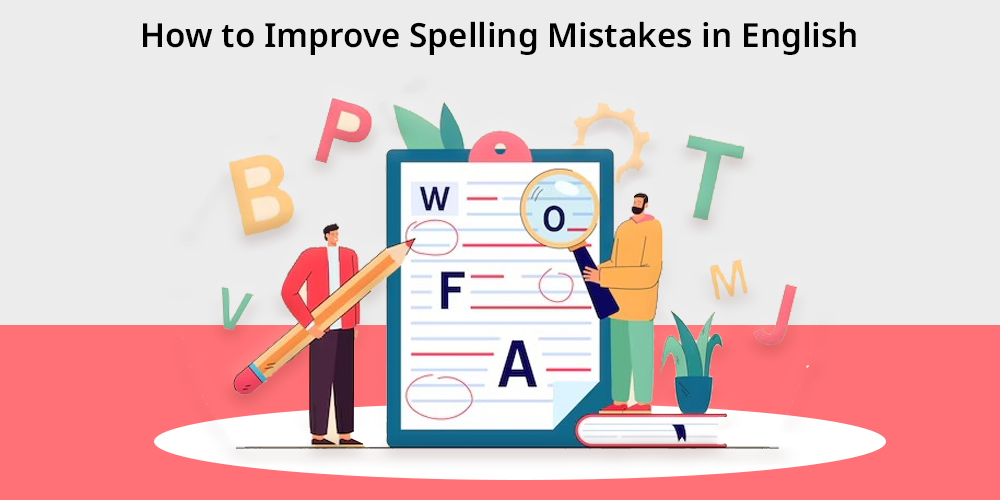
Spelling mistakes in English are more common than we think. These mistakes can occur at all levels, from students in school to professionals in the working environment.
Whether it is confusing ‘accommodate’ with ‘acommodate’ or focusing on the difference between ‘their’ and ‘there,’ spelling errors can affect the clarity of your message and even your confidence.
Let’s understand the difference between IGCSE english and GCSE english .
The good news is, improving your spelling skills doesn’t require memorising long lists of words. It’s about understanding why mistakes happen and building better language habits over time.
Contents
- Why Spelling Matters in English?
- Common Causes of Spelling Mistakes
- 12 Effective Ways to Improve Spelling Mistakes in English
- 1. Learn Phonics and Word Patterns
- 2. Keep a Personal Spelling Journal
- 3. Use Mnemonics to Remember Difficult Words
- 4. Read Regularly to Improve Spelling Naturally
- 5. Use a Dictionary
- 6. Practice with Spelling Games and Apps
- 7. Write Daily and Proofread Your Work
- 8. Use Spell Check Tools
- 9. Watch Out for Prefixes, Suffixes and More
- 10. Learn from Mistakes
- 11. Silent Letters – Ignore Them While Speaking, Include Them While Writing
- 12. Seek Feedback from Teachers or Language Experts
- Conclusion
- Bonus: 20 Commonly Misspelt English Words (with Correct Spelling)
Why Spelling Matters in English?
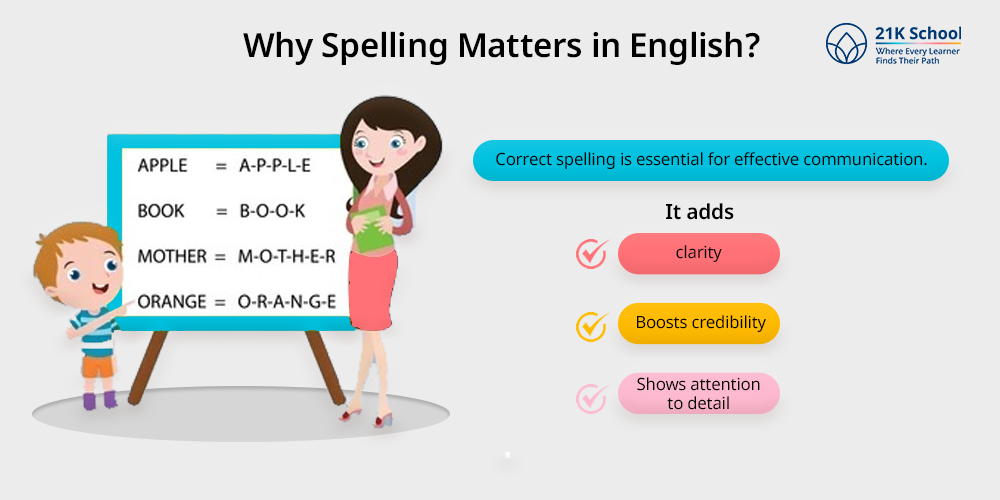
Correct spelling is essential for effective communication. It adds clarity, boosts credibility, and shows attention to detail. When you spell a word wrong, even if your grammar is perfect, it can make your writing seem less reliable.
In academic writing, emails, or even on social media, spelling errors can create misunderstandings. For students, spelling can directly affect grades. For professionals, it can leave a poor impression.
Explore the benefits of learning english .
Common Causes of Spelling Mistakes
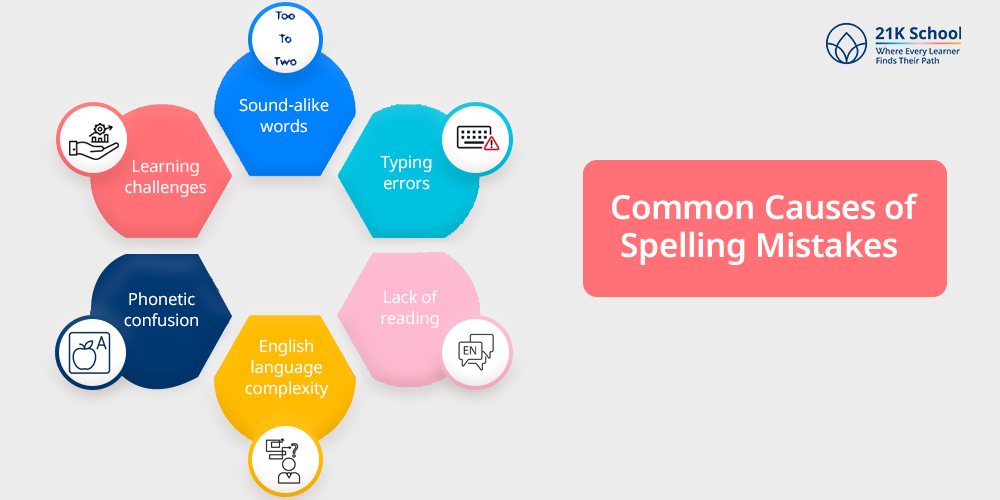
Understanding the root causes of spelling mistakes is the first step toward fixing them. Some common reasons include:
- Sound-alike words: Words that sound the same but are spelt differently (like “to,” “too,” and “two”).
- Typing errors: Fast typing or autocorrect can lead to unnoticed mistakes.
- Lack of reading: If you’re not exposed to correct spelling regularly, it’s hard to remember it.
- English language complexity: English has many irregular spellings and exceptions.
- Phonetic confusion: Some words aren’t spelt the way they sound (like “knife” or “Wednesday”).
- Learning challenges: Dyslexia or other learning differences can affect spelling ability.
Explore why grammar is important and how you can correct spelling mistakes in English effectively.
12 Effective Ways to Improve Spelling Mistakes in English
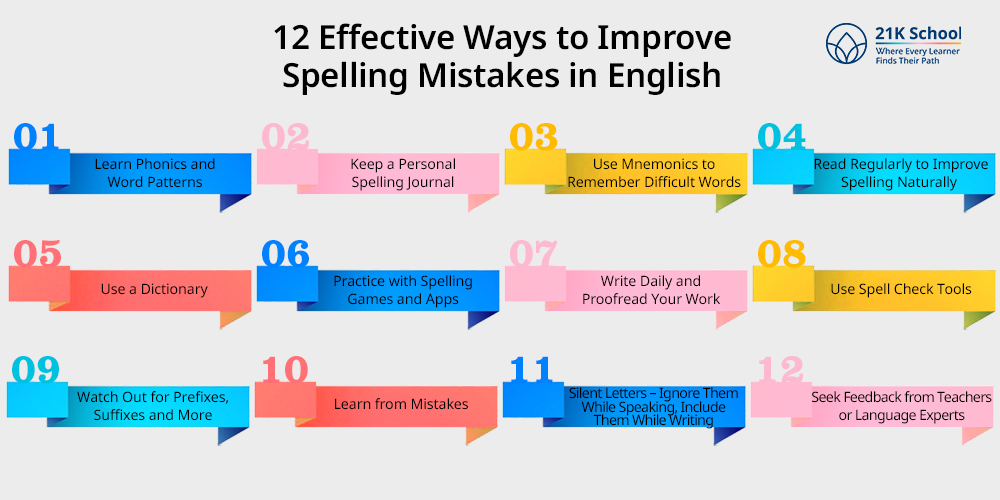
Improving your English spelling doesn’t require perfection overnight. It’s a process, and small steps every day lead to lasting results.
Here are 12 proven ways to improve spelling mistakes and strengthen your English writing skills.
1. Learn Phonics and Word Patterns
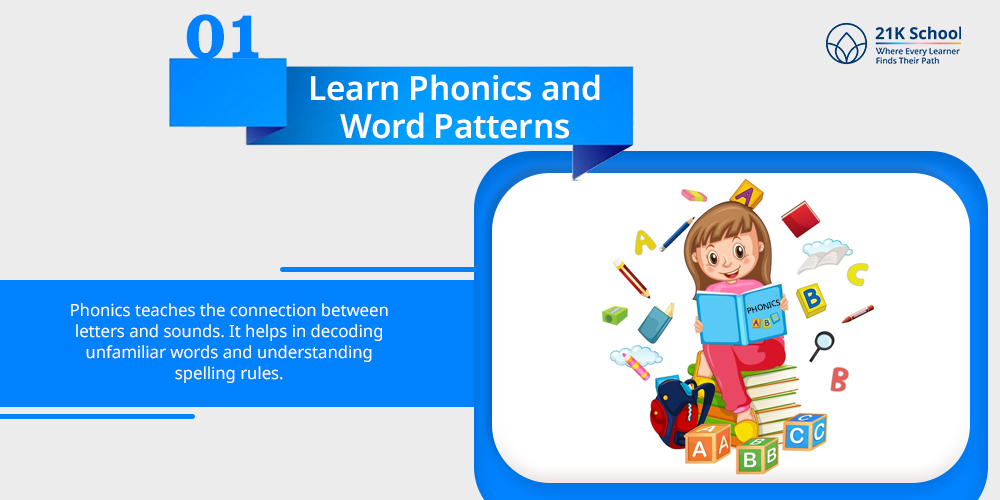
Phonics teaches the connection between letters and sounds. It helps in decoding unfamiliar words and understanding spelling rules. For example, once you know that “-tion” sounds like “shun,” you’ll find it easier to spell words like “attention” or “caution“.
Recognising patterns like “ie” vs “ei” or double consonants after short vowels will also help. Start with basic sound-letter rules, then move on to common word families and root words.
2. Keep a Personal Spelling Journal
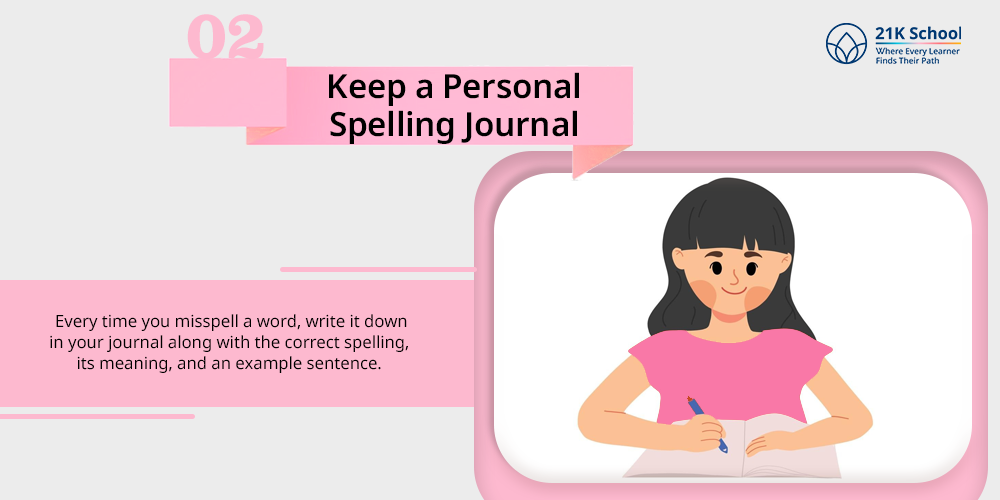
A spelling journal is a simple but powerful tool. Every time you misspell a word, write it down in your journal along with the correct spelling, its meaning, and an example sentence. Review your journal regularly.
Over time, you’ll start seeing patterns in your errors and how much you’ve improved. This habit helps personalise your learning and keeps your spelling practice consistent.
3. Use Mnemonics to Remember Difficult Words
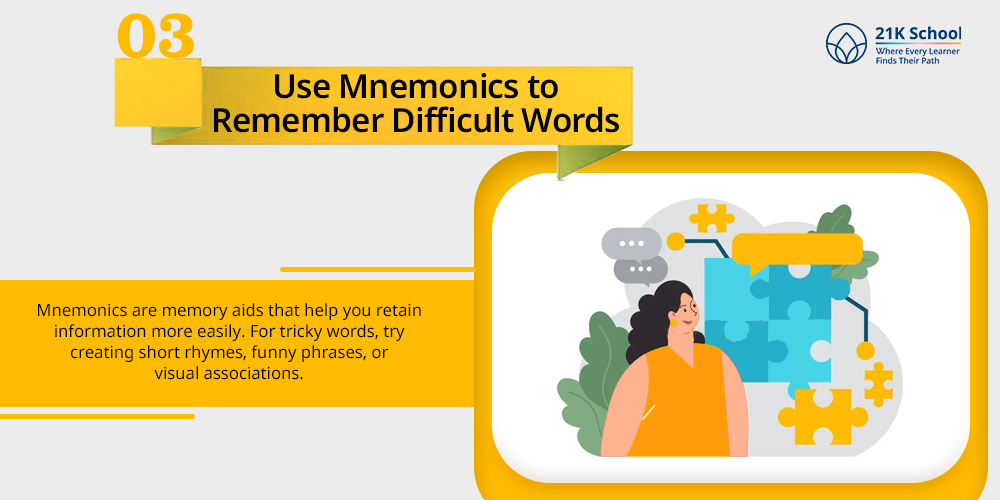
Mnemonics are memory aids that help you retain information more easily. For tricky words, try creating short rhymes, funny phrases, or visual associations. For example:
- “Necessary” – has one collar (c) and two sleeves (s)
- “Rhythm” – Rhythm Helps Your Two Hips Move
The sillier the mnemonic, the easier it is to remember!
4. Read Regularly to Improve Spelling Naturally
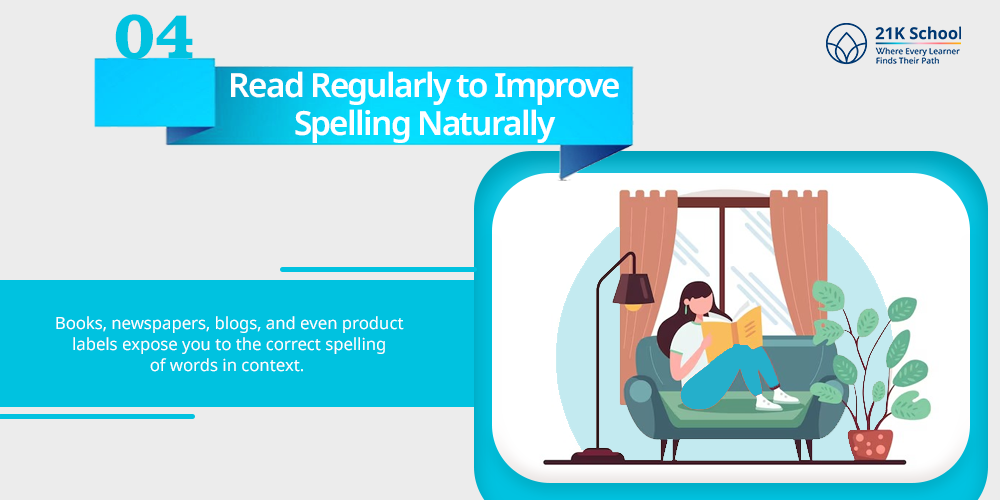
One of the most effective ways to improve your English spelling is to develop a habit of reading . Books, newspapers, blogs, and even product labels expose you to the correct spelling of words in context.
Your brain absorbs spelling patterns without you even realising it. Choose content that matches your level and interests so that reading feels enjoyable, not forced. Over time, reading boosts both vocabulary and spelling accuracy.
Explore the tips to read better and faster
5. Use a Dictionary
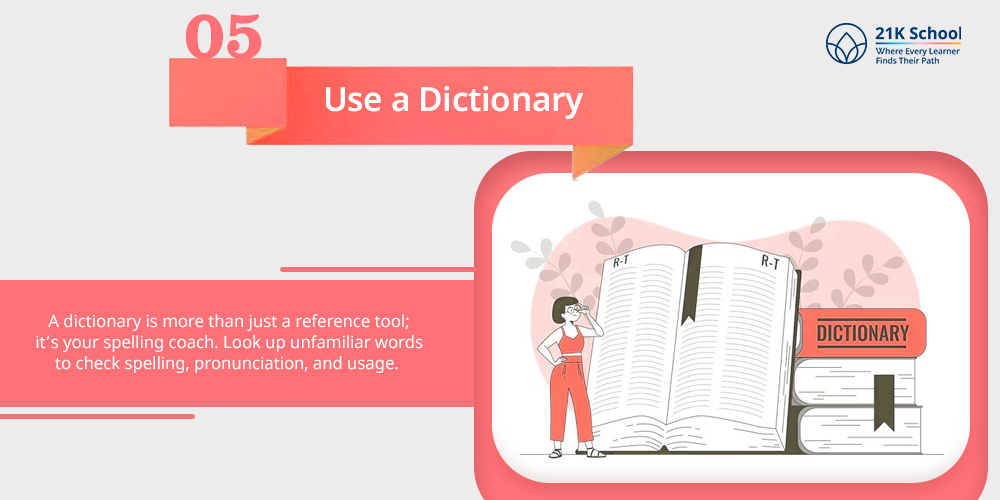
A dictionary is more than just a reference tool; it’s your spelling coach. Look up unfamiliar words to check spelling, pronunciation, and usage. Online dictionaries often have audio features, so you can hear how a word sounds.
Keep a pocket dictionary, or bookmark a reliable online one like Oxford or Merriam-Webster. Developing the habit of checking spellings will sharpen your awareness of word structure.
6. Practice with Spelling Games and Apps
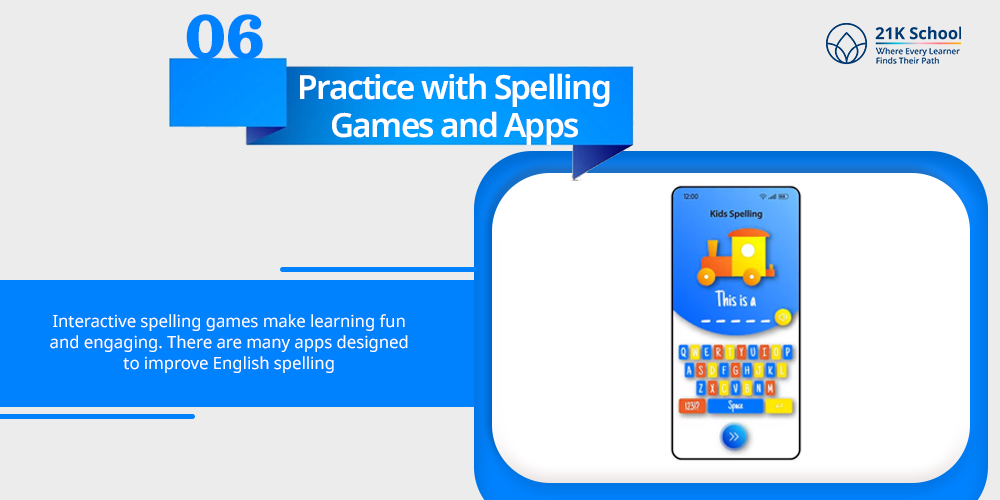
Interactive spelling games make learning fun and engaging. There are many apps designed to improve English spelling, such as:
- Grammarly – for real-time writing help
- Spelling Bee – to test and build vocabulary
- Wordscapes, Elevate, WordUp – for puzzle-based learning
You can also find printable spelling games for offline practice. Games improve retention by involving visual, auditory, and kinesthetic learning styles.
7. Write Daily and Proofread Your Work
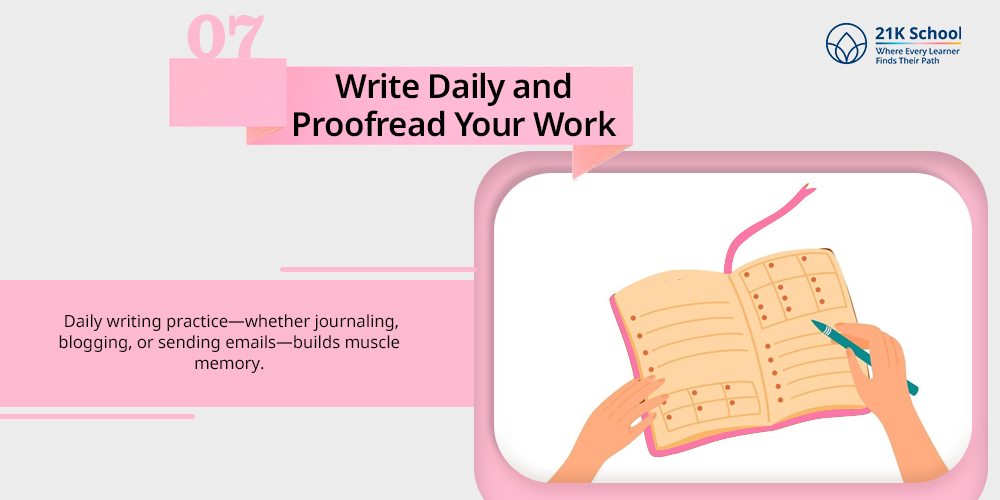
Daily writing practice—whether journaling, blogging, or sending emails—builds muscle memory. When you write regularly, you naturally become more careful with spelling.
Also read: Top 15 Memory Games for Kids
But writing alone isn’t enough. Always proofread your work. Slow down and read every word. Reading aloud helps you catch spelling mistakes that your eyes may miss when skimming silently.
8. Use Spell Check Tools
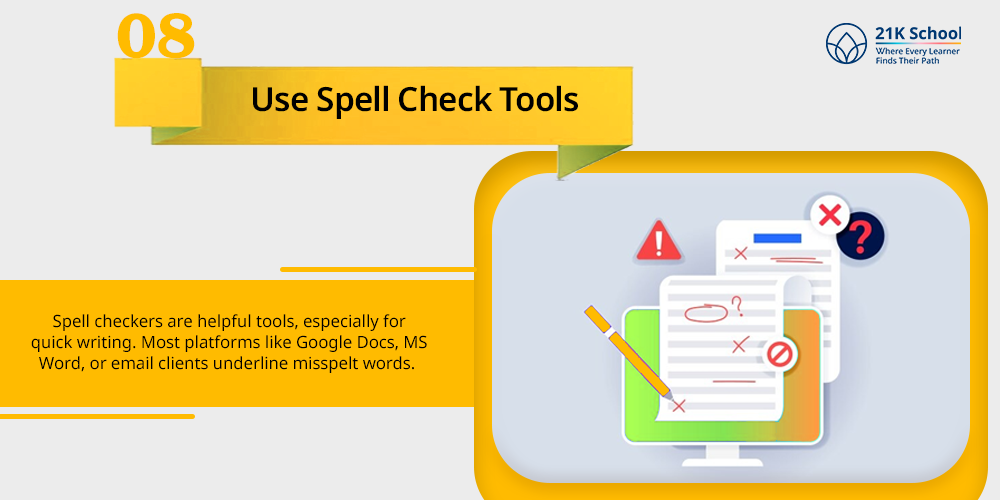
Spell checkers are helpful tools, especially for quick writing. Most platforms like Google Docs, MS Word, or email clients underline misspelt words.
Use them to spot errors, but don’t rely on them blindly. Check why a word was marked wrong and learn from it. Understanding your mistakes will help prevent them in the future.
9. Watch Out for Prefixes, Suffixes and More
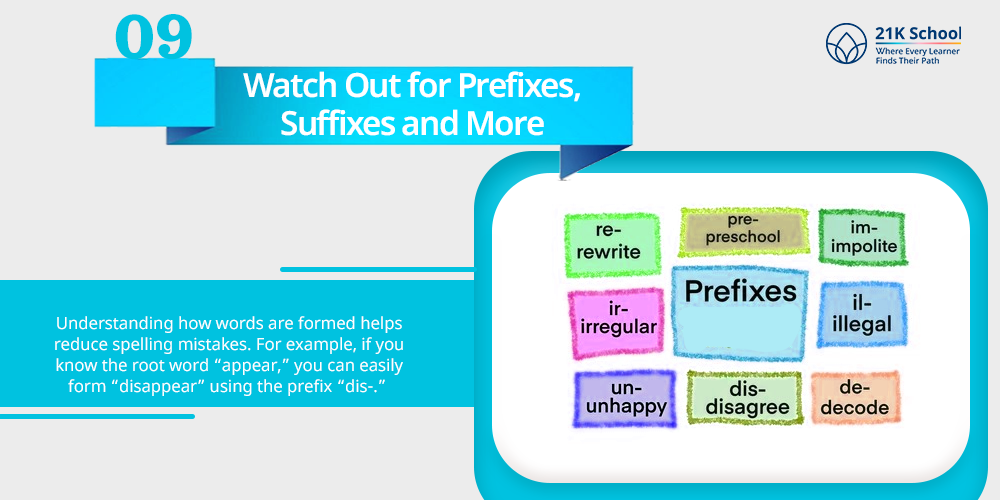
Understanding how words are formed helps reduce spelling mistakes. For example, if you know the root word “appear,” you can easily form “disappear” using the prefix “dis-.”
Learning common prefixes and suffixes helps you predict the correct spelling of longer words. It also builds a stronger vocabulary .
10. Learn from Mistakes

Mistakes are part of learning. Instead of feeling frustrated, use them as learning moments. Every time you misspell a word, pause and figure out what went wrong.
Did you confuse it with a similar-sounding word? Did you forget a silent letter? Write it down and review it later. By studying your errors, you’ll slowly train your brain to avoid them.
11. Silent Letters – Ignore Them While Speaking, Include Them While Writing
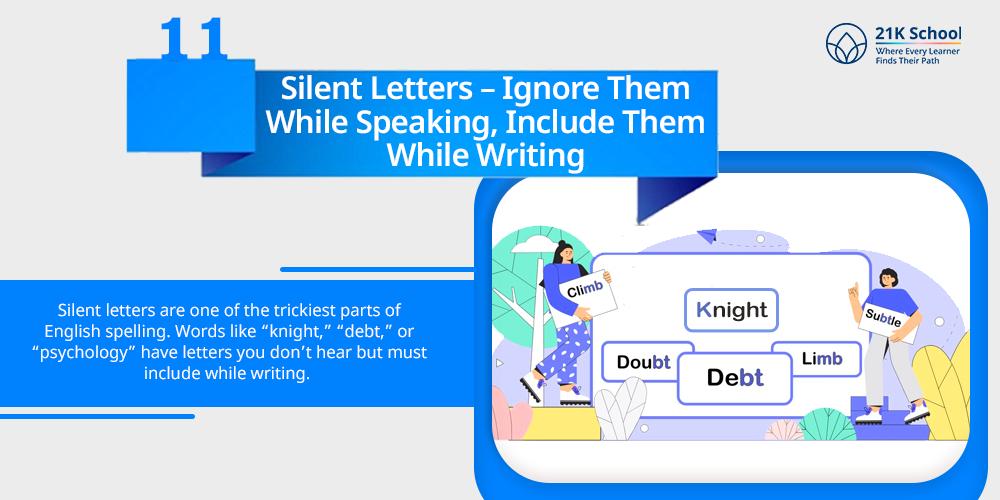
Silent letters are one of the trickiest parts of English spelling. Words like “knight,” “debt,” or “psychology” have letters you don’t hear but must include while writing.
The best way to master them is through memorisation and regular practice. Create a list of common words with silent letters and use them in written exercises. The more you write them, the more natural they’ll feel.
12. Seek Feedback from Teachers or Language Experts

Sometimes, another pair of eyes is all you need. Share your writing with someone who has strong English skills—a teacher, tutor, or mentor. They can spot patterns, correct recurring mistakes, and suggest tips you might not know.
You can also join online writing groups or forums where members give feedback on each other’s work. Learning from others speeds up your progress.
Learn importance of english language .
Conclusion
Spelling mistakes don’t mean you’re bad at English; they simply show where you can improve. With the right strategies, tools, and a little patience, anyone can learn to spell better.
Focus on daily habits like reading, writing, reviewing errors, and staying curious about words. Improving spelling in English isn’t just about avoiding mistakes. It’s about expressing yourself more clearly and confidently.
Your next read: 12 Creative English Activities for Students
Bonus: 20 Commonly Misspelt English Words (with Correct Spelling)
- Definitely ✅ (Not “definately”)
- Separate ✅ (Not “seperate”)
- Accommodation ✅ (Not “accomodation”)
- Calendar ✅ (Not “calender”)
- Embarrass ✅ (Not “embarass”)
- Government ✅ (Not “goverment”)
- Privilege ✅ (Not “privelege”)
- Maintenance ✅ (Not “maintainance”)
- Occurrence ✅ (Not “occurence”)
- Receive ✅ (Not “recieve”)
- Recommend ✅ (Not “reccomend”)
- Vacuum ✅ (Not “vaccum”)
- Surprise ✅ (Not “suprise”)
- Success ✅ (Not “sucess”)
- Weird ✅ (Not “wierd”)
- Restaurant ✅ (Not “resturant”)
- Neighbour ✅ (Not “neihbour”)
- Argument ✅ (Not “arguement”)
- Tomorrow ✅ (Not “tommorow”)
- Convenience ✅ (Not “convinience”)

